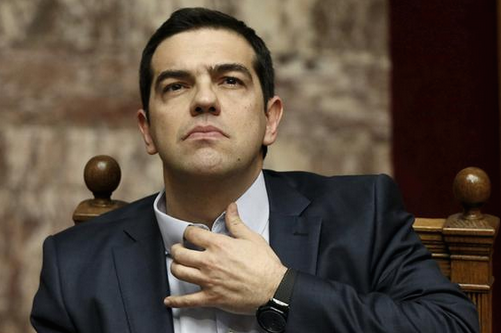– Reports Of Secret Drachma Plots Leave Tsipras Facing Fresh Crisis (ZeroHedge, July 26, 2015):
On Friday, we brought you the shocking story of the rebellion that never was in Greece.
According to FT, Former Greek Energy Minister and maverick among mavericks Panayotis Lafazanis convened a “secret” meeting at the Oscar Hotel in Athens on July 14 at which he attempted to convince Syriza hardliners (including, in FT’s words, “supporters of the late Venezuelan president Hugo Chávez [and some] old-fashioned communists”) to storm the Greek mint, seize the country’s currency reserves, and, if necessary, arrest central bank governor Yannis Stournaras.
(Lafazanis)
Obviously, the plan was never implemented, but if the story is even partly true it betrays the degree to which Greece teetered on the edge of social upheaval and even civil war in the days that followed PM Alexis Tsipras’ decision to concede to creditors’ demands and abandon not only Syriza’s election mandate but the very referendum outcome he had himself campaigned for just days prior.
Now that Tsipras has succeeded in compelling Greek lawmakers to cede the country’s sovereignty to Brussels in exchange for the right to use the euro, tales of unrealized redenomination plots have come out of the woodwork so to speak, and now, in addition to the scheme described above and rumors that a return to the drachma was nearly financed by a loan from the Kremlin, we get a glimpse at yet another plan hatched behind the scenes, this time courtesy of a recorded conference call between Yanis Varoufakis and “members of international hedge funds.”
Here’s the story from Kathimerini:
Former Finance Minister Yanis Varoufakis has claimed that he was authorized by Alexis Tsipras last December to look into a parallel payment system that would operate using wiretapped tax registration numbers (AFMs) and could eventually work as a parallel banking system, Kathimerini has learned.
In a teleconference call with members of international hedge funds that was allegedly coordinated by former British Chancellor of the Exchequer Norman Lamont, Varoufakis claimed to have been given the okay by Tsipras last December – a month before general elections that brought SYRIZA to power – to plan a payment system that could operate in euros but which could be changed into drachmas “overnight” if necessary, Kathimerini understands.
Varoufakis worked with a small team to prepare the plan, which would have required a staff of 1,000 to implement but did not get the final go-ahead from Tsipras to proceed, he said.
The call took place on July 16, more than a week after Varoufakis left his post as finance minister.
The plan would involve hijacking the AFMs of taxpayers and corporations by hacking into General Secretariat of Public Revenues website, Varoufakis told his interlocutors. This would allow the creation of a parallel system that could operate if banks were forced to close and which would allow payments to be made between third parties and the state and could eventually lead to the creation of a parallel banking system, he said.
As the general secretariat is a system that is monitored by Greece’s creditors and is therefore difficult to access, Varoufakis said he assigned a childhood friend of his, an information technology expert who became a professor at Columbia University, to hack into the system. A week after Varouakis took over the ministry, he said the friend telephoned him and said he had “control” of the hardware but not the software “which belongs to the troika.”

Apparently, Varoufakis planned to take control of the computers first, then hack into the ministry’s software, steal the code, and design the parallel payments system. Here are excerpts from the call, again from Kathimerini, quoting Varoufakis:
“The prime minister before he became PM, before we won the election in January, had given me the green light to come up with a Plan B. And I assembled a very able team, a small team as it had to be because that had to be kept completely under wraps for obvious reasons. And we had been working since the end of December or beginning of January on creating one.
“What we planned to do was the following. There is the website of the tax office like there is in Britain and everywhere else, where citizens, taxpayers go into the website they use their tax file number and they transfer through web banking monies from the bank account to their tax file number so as to make payments on VAT, income tax and so on and so forth.
“We were planning to create, surreptitiously, reserve accounts attached to every tax file number, without telling anyone, just to have this system in a function under wraps. And, at the touch of a button, to allow us to give PIN numbers to tax file number holders, to taxpayers.
“That would have created a parallel banking system while the banks were shut as a result of the ECBs aggressive action to deny us some breathing space.
“This was very well developed and I think it would have made a very big difference because very soon we could have extended it, using apps on smartphones and it could become a functioning parallel system and of course this would be euro denominated but at the drop of a hat it could be converted to a new drachma.
“But let me tell you – and this is quite a fascinating story – what difficulties I faced. The General Secretary of Public Revenues within my ministry is controlled fully and directly by the troika. It was not under control of my ministry, of me as minister, it was controlled by Brussels.
Ok, so problem number one: The general secretary of information systems on the other hand was controlled by me, as minister. I appointed a good friend of mine, a childhood friend of mine who had become professor of IT at Columbia University in the States and so on. I put him in because I trusted him to develop this.
“At some point, a week or so after we moved into the ministry, he calls me up and says to me: ‘You know what? I control the machines, I control the hardware but I do not control the software. The software belongs to the troika controlled General Secretary of Public Revenues. What do I do?’
“So we decided to hack into my ministry’s own software program in order to be able break it up to just copy just to copy the code of the tax systems website onto a large computer in his office so that he can work out how to design and implement this parallel payment system.
“And we were ready to get the green light from the PM when the banks closed in order to move into the General Secretariat of Public Revenues, which is not controlled by us but is controlled by Brussels, and to plug this laptop in and to energize the system.
In short, Varoufakis claims Tsipras had pre-approved the creation of secret accounts for every tax filer (which, knowing Greece, might have left Varoufakis short on accounts for quite a few citizens). Greeks would be made aware of the accounts’ existence in the event the banking system ceased to function altogether, and Athens would effectively facilitate payments through the new system in defiance of the EMU. Clearly, this would not have been well received by Brussels – especially the bit about hacking their software – but ultimately, because the new system would be entirely controlled by Varoufakis’ finance ministry, it could be converted to the drachma immediately.
Kathimerini goes on the quote Varoufakis as saying that German FinMin Wolfgang Schaeuble intended to use Grexit as leverage to force France into supporting a system that ceded fiscal decision making to Brussels (which would of course mean giving Berlin more say over EMU countries’ finances):
“Schaeuble has a plan. The way he described it to me is very simple. He believes that the eurozone is not sustainable as it is. He believes there has to be some fiscal transfers, some degree of political union. He believes that for that political union to work without federation, without the legitimacy that a properly elected federal parliament can render, can bestow upon an executive, it will have to be done in a very disciplinary way. And he said explicitly to me that a Grexit is going to equip him with sufficient bargaining, sufficient terrorising power in order to impose upon the French that which Paris has been resisting. And what is that? A degree of transfer of budget making powers from Paris to Brussels.”
The new revelations raise serious concerns for Alexis Tsipras. The deep divisions within Syriza are by now well publicized, but reports of covert plans to establish parallel banking systems using tax filers’ IDs and the idea that elements within the ruling party plotted to seize billions in currency reserves and take control of the central bank have left some lawmakers demanding answers. Here’s Reuters:
The center-right New Democracy party and the centrist To Potami and the Socialist Pasok parties, which all backed Tsipras in parliamentary votes on the bailout this month, demanded a response to the reports.
“The revelations that are coming out raise a major political, economic and moral issue for the government which needs in-depth examination,” it said in a statement.
“Is it true that a designated team in the finance ministry had undertaken work on a backup plan? Is it true they had planned to raid the national Mint and that they prepared for a parallel currency by hacking the tax registration numbers of the taxpayers?”
Tsipras thus finds himself in an extraordinarily difficult spot. Passing two sets of prior bailout actions through parliament cost him dearly on the political front as more than 30 Syriza MPs defected on both votes. This means he’ll be forced to rely on the support of opposition lawmakers to govern going forward or at least until he can call for elections and get a “clean start” after the third troika program is formally in place.
If Syriza’s political opponents come to believe that their efforts to back Tsipras on the way to keeping Greece in the euro are being subverted in secret by members of Tsipras’ own party, their support could dry up quickly leaving the PM with no support from either side of the aisle.
Given all of this, it’s easy to see why many analysts and commentators still belive that Grexit – and everything that comes with it both for Greece and for the EMU – is still the most likely outcome.


